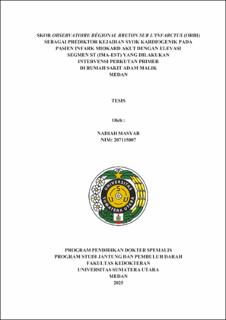Skor Observatoire Régional Breton Sur L’infarctus (ORBI) Sebagai Prediktor Kejadian Syok Kardiogenik Pada Pasien Infark Miokard Akut Dengan Elevasi Segmen ST (IMA-EST) Yang Dilakukan Intervensi Perkutan Primer Di Rumah Sakit Adam Malik Medan
The Observatoire Régional Breton Sur L’infarctus (ORBI) Score as a Predictor of Cardiogenic Shock in Patients With ST-Segment Elevation Myocardial Infarction (STEMI) Undergoing Primary Percutaneous Intervention at Adam Malik Hospital Medan

Date
2025-08-14Author
Masyab, Nadiah
Advisor(s)
Sitepu, Andika
Sumadio, Muhammad Yolandi
Metadata
Show full item recordAbstract
ABSTRACT
Introduction: Cardiogenic shock (CS) is a severe complication of acute coronary syndrome, with an incidence of 4–12%. Approximately 30–40% of cases occur upon hospital admission, while 60–70% develop during hospitalization. Mortality tends to be higher among patients who develop CS during hospitalization compared to those who present with CS at admission. The Observatoire Régional Breton sur l'Infarctus (ORBI) score is the first risk score designed to identify STEMI patients undergoing percutaneous coronary intervention (PCI) who are at risk of developing CS during hospitalization, thus allowing effective risk stratification based on individual susceptibility to CS as a foundation for management.
Objective: To evaluate the validity of the ORBI score as a predictor of cardiogenic shock in STEMI patients with symptom onset ≤48 hours undergoing primary PCI at Adam Malik General Hospital, Medan.
Results: This retrospective cohort study included 203 STEMI patients treated at Adam Malik General Hospital. The study demonstrated that the ORBI score is valid in predicting the occurrence of cardiogenic shock during hospitalization among STEMI patients with onset ≤48 hours undergoing primary PCI, based on calibration testing (p-value 0.000), with an AUC of 0.92, sensitivity of 93.8%, and specificity of 87.1%.
Conclusion: The ORBI score demonstrated adequate predictive ability, suggesting its potential application in this population.
Collections
- Master Theses [108]
